10+ Outdoor Risk Assessment Examples to Download
There is no better way to say it, but the great outdoors is something most people would prefer to hold events than indoors. Some would even state that being outdoors gives you a sense of freedom. Having to do events like sports or even business related events outdoors can also pose some risks. These risks differ from little to a lot and safe to severe. Of course, regardless of where you may be, risks are always present. But just like problems, there are solutions. Check them out below, how to lessen these risks to have fun at your next outdoor event.
10+ Outdoor Risk Assessment Examples
1. Outdoor Events Risk Assessment
2. General Outdoor Risk Assessment
3. Foundation Stage Outdoor Risk Assessment
4. Generic Risk Assessment for Outdoor
5. Outdoor Risk Assessment Checklist
6. University Outdoor Risk Assessment
7. Outdoor Environment Risk Assessment
8. Risk Assessment Reception Outdoor
9. Venture Outdoor Risk Assessment
10. Outdoor Sports Clubs Risk Assessment
11. Outdoor Site Risk Assessment
Definition of Risk
A risk means the possibility of something unexpected happening. Usually this leads to something very bad. An incident that may happen that could cause bad results, damages or loss. A risk is the process of something that could happen. In addition to that, it also means you are taking full responsibility for something that may happen outside of your control and actions. A situation that is cited as dangerous and would have the possibility of loss.
Definition of Assessment
An assessment is a series of tests. These tests are used to evaluate, gather data, analyze and interpret what has been given. From the gathered information, this is where the evaluation and the judgement begins. Assessments are not only used for judgement but they are also used as a basis of learning about something or someone. By understanding the information that has been given, you are able to give out a good conclusion or the outcome from the assessment. Assessments can be used for anything that can be assessed for. In this case a risk assessment. To assess a certain risk, one must know and understand the basis of it.
Definition of Risk Assessment
A risk assessment is a scientific process of assessing and evaluating potential risks that may involve danger. It is also a term that is often used to define or describe the whole process of identifying hazards and risks around us. In addition to that, it also determines ways to help eliminate or lessen the severity of risks. It also helps to control what can be controlled and find a solution to the ones we cannot control. A risk assessment also lists down the potential hazards through a careful study of gathering information and gives out a solution for each hazard.
Definition of Outdoor Risk Assessment
An outdoor risk assessment shows the problems that people who hold out events may deal with than indoors. This assessment shows the lists of possible issues that could affect anyone or anything without further notice. Outdoor risks involved are traffic, pollution and natural causes. To be able to avoid them as much as possible, one must simply understand the possible hazards and risks that go with them. In addition to that, as much as there are signs that warn, there is still a possibility of it to be ignored or misunderstood. For this reason doing an outdoor risk assessment is highly recommended. Avoiding accidents and natural causes is nothing short of a feat.
Importance of Risk Assessment
Why is a risk assessment so important? To be able to control a certain hazard or risk, one must be able to understand the severity of the problem. This is where the risk assessment comes into play. The assessor or anyone who is able to do the assessment would be gathering information in a safe environment. They will gather data or information about the possible risks that may happen and how to avoid them or control them. By doing so, they are giving a solution to a problem that could happen anytime and anywhere. Risk assessments are also used for analyzing and evaluating if the place is safe enough to work or is better to move.
Tools for Risk Assessment
- Bullets
- Narrative
- Outline
- Questionnaire
- Checklist
Tips for Doing a Risk Assessment
- Gather information – Before you begin your risk assessment, gather enough information. Gather data that supports your assessment topic or assessment in general. These data should also be clear, concise and match what you are assessing about.
- List it down – List down the hazards or risks you found. Make a hypothetical solution to each hazard before you begin to analyze the given data. Survey some places if they may have the same risks and severity of it.
- Keep it professional – Doing your best to find a solution is no laughing matter. As you do the assessment, keep in mind that how you go about with this should be kept confidential and professional.
- Analyze and search for a solution – Analyze the data given by placing yourself in the situation. In this stage, you are able to answer the objectives and your questions by giving each problem a solution. This stage is very important in doing a risk assessment. As one slip may cause the whole assessment to falter.
- Evaluate your work –Now that you have analyzed and searched for a solution, evaluate your assessment. Was your assessment successful or not. Did you have any evidence that supported the assessment in general? After you have evaluated your work, keep a record of it.
FAQs
How dangerous is it to avoid doing a risk assessment?
Whether you are going to hold an event, a business event or a sports event outdoors, it is always best to begin by doing a risk assessment. This is a good way to assess the risks that may happen and may go along the way. If one may refuse to do a risk assessment outdoors, chances are the severity of the situation may be out of control.
Is there a way to control the risk outdoors?
Yes. After you have done the assessment, check the results and follow them step by step. The reason for doing this is to be able to learn to control the risks that may be found when doing events outdoors.
Can a risk assessment fail?
There is a possibility that a risk assessment will fail. The reasons for this is when the data gathered is incomplete, the analysis was wrong and the evaluation was misinterpreted.
Who is affected by this risk assessment?
Anyone can be affected by the result of the risk assessment. Hence the reason why taking a risk assessment should be taken seriously.
Outdoor risks are everywhere. From natural to man made. It is always best to do an assessment to know the potential risks and evaluate the level of severity or seriousness it is. Especially when the people who may be attending the event differ in ages and health. Be careful how you do your assessment as the results can also be the root cause for the hazard to get worse.
10+ Outdoor Risk Assessment Examples to Download
![10+ Outdoor Risk Assessment Examples [ Events, Sports, Business ]](https://images.examples.com/wp-content/uploads/2021/07/10-Outdoor-Risk-Assessment-Examples-Events-Sports-Business-.jpg)
There is no better way to say it, but the great outdoors is something most people would prefer to hold events than indoors. Some would even state that being outdoors gives you a sense of freedom. Having to do events like sports or even business related events outdoors can also pose some risks. These risks differ from little to a lot and safe to severe. Of course, regardless of where you may be, risks are always present. But just like problems, there are solutions. Check them out below, how to lessen these risks to have fun at your next outdoor event.
10+ Outdoor Risk Assessment Examples
1. Outdoor Events Risk Assessment
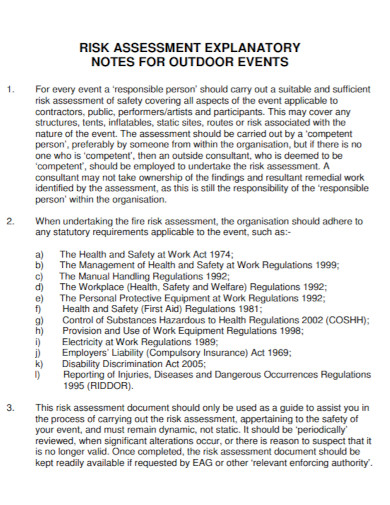
cumbria.gov.uk
Details
File Format
PDF
Size: 37 KB
2. General Outdoor Risk Assessment
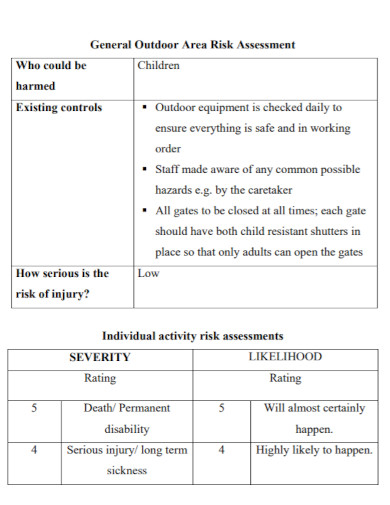
tgps.uk.com
Details
File Format
PDF
Size: 358 KB
3. Foundation Stage Outdoor Risk Assessment
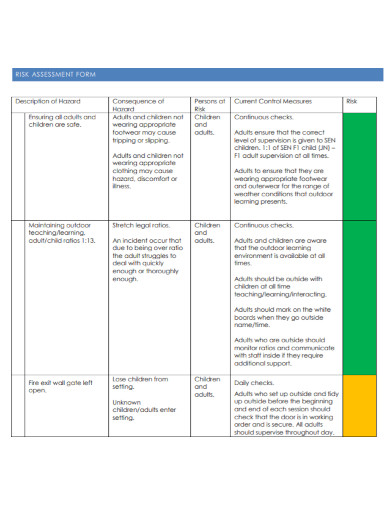
maltbylillyhallacademy.com
Details
File Format
PDF
Size: 181 KB
4. Generic Risk Assessment for Outdoor
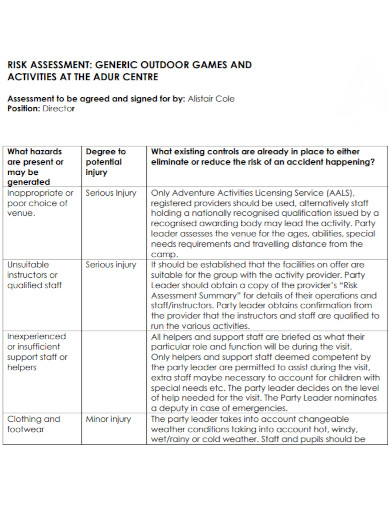
cdn.website-editor.net
Details
File Format
PDF
Size: 61 KB
5. Outdoor Risk Assessment Checklist
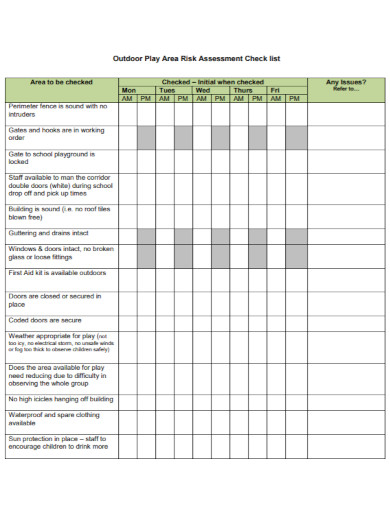
barnsley.gov.uk
Details
File Format
PDF
Size: 256 KB
6. University Outdoor Risk Assessment
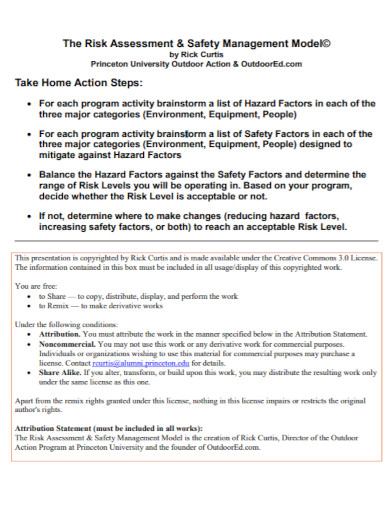
outdoored.com
Details
File Format
PDF
Size: 737 KB
7. Outdoor Environment Risk Assessment
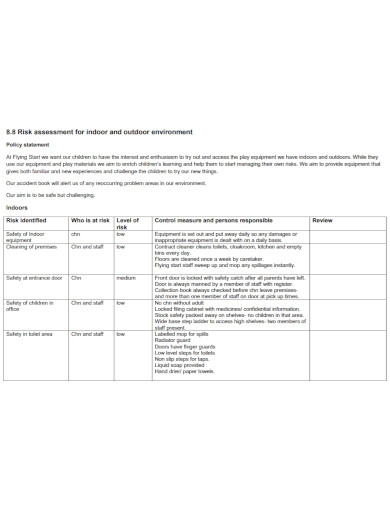
flyingstartnursery.com
Details
File Format
PDF
Size: 272 KB
8. Risk Assessment Reception Outdoor
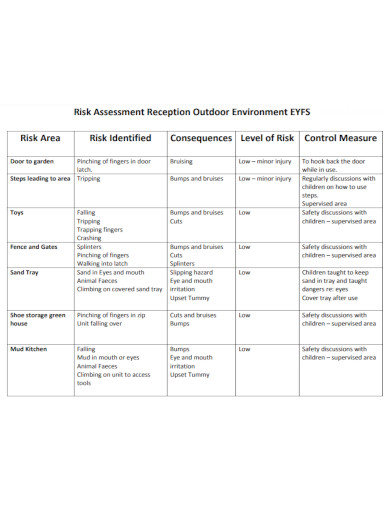
beechwood.org.uk
Details
File Format
PDF
Size: 35 KB
9. Venture Outdoor Risk Assessment
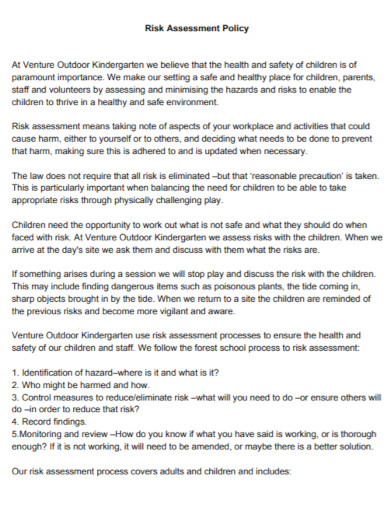
ventureok.co.uk
Details
File Format
PDF
Size: 179 KB
10. Outdoor Sports Clubs Risk Assessment
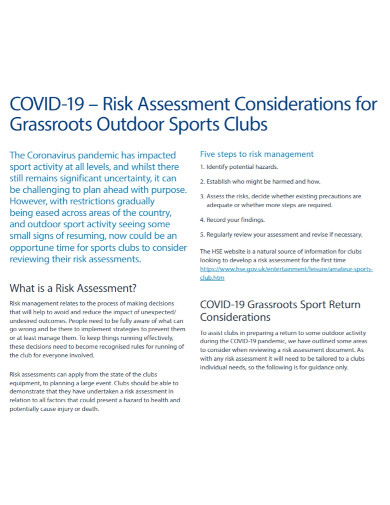
media-library
Details
File Format
PDF
Size: 781 KB
11. Outdoor Site Risk Assessment
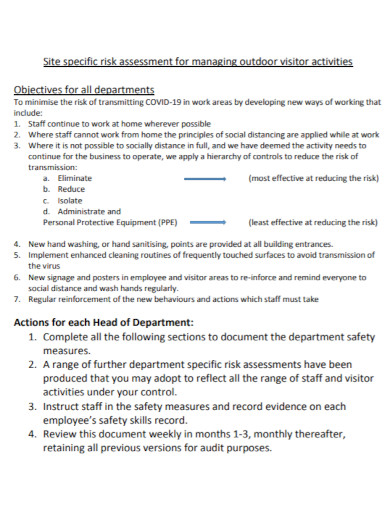
chatsworth.org
Details
File Format
PDF
Size: 545 KB
Definition of Risk
A risk means the possibility of something unexpected happening. Usually this leads to something very bad. An incident that may happen that could cause bad results, damages or loss. A risk is the process of something that could happen. In addition to that, it also means you are taking full responsibility for something that may happen outside of your control and actions. A situation that is cited as dangerous and would have the possibility of loss.
Definition of Assessment
An assessment is a series of tests. These tests are used to evaluate, gather data, analyze and interpret what has been given. From the gathered information, this is where the evaluation and the judgement begins. Assessments are not only used for judgement but they are also used as a basis of learning about something or someone. By understanding the information that has been given, you are able to give out a good conclusion or the outcome from the assessment. Assessments can be used for anything that can be assessed for. In this case a risk assessment. To assess a certain risk, one must know and understand the basis of it.
Definition of Risk Assessment
A risk assessment is a scientific process of assessing and evaluating potential risks that may involve danger. It is also a term that is often used to define or describe the whole process of identifying hazards and risks around us. In addition to that, it also determines ways to help eliminate or lessen the severity of risks. It also helps to control what can be controlled and find a solution to the ones we cannot control. A risk assessment also lists down the potential hazards through a careful study of gathering information and gives out a solution for each hazard.
Definition of Outdoor Risk Assessment
An outdoor risk assessment shows the problems that people who hold out events may deal with than indoors. This assessment shows the lists of possible issues that could affect anyone or anything without further notice. Outdoor risks involved are traffic, pollution and natural causes. To be able to avoid them as much as possible, one must simply understand the possible hazards and risks that go with them. In addition to that, as much as there are signs that warn, there is still a possibility of it to be ignored or misunderstood. For this reason doing an outdoor risk assessment is highly recommended. Avoiding accidents and natural causes is nothing short of a feat.
Importance of Risk Assessment
Why is a risk assessment so important? To be able to control a certain hazard or risk, one must be able to understand the severity of the problem. This is where the risk assessment comes into play. The assessor or anyone who is able to do the assessment would be gathering information in a safe environment. They will gather data or information about the possible risks that may happen and how to avoid them or control them. By doing so, they are giving a solution to a problem that could happen anytime and anywhere. Risk assessments are also used for analyzing and evaluating if the place is safe enough to work or is better to move.
Tools for Risk Assessment
Bullets
Narrative
Outline
Questionnaire
Tips for Doing a Risk Assessment
Gather information – Before you begin your risk assessment, gather enough information. Gather data that supports your assessment topic or assessment in general. These data should also be clear, concise and match what you are assessing about.
List it down – List down the hazards or risks you found. Make a hypothetical solution to each hazard before you begin to analyze the given data. Survey some places if they may have the same risks and severity of it.
Keep it professional – Doing your best to find a solution is no laughing matter. As you do the assessment, keep in mind that how you go about with this should be kept confidential and professional.
Analyze and search for a solution – Analyze the data given by placing yourself in the situation. In this stage, you are able to answer the objectives and your questions by giving each problem a solution. This stage is very important in doing a risk assessment. As one slip may cause the whole assessment to falter.
Evaluate your work –Now that you have analyzed and searched for a solution, evaluate your assessment. Was your assessment successful or not. Did you have any evidence that supported the assessment in general? After you have evaluated your work, keep a record of it.
FAQs
How dangerous is it to avoid doing a risk assessment?
Whether you are going to hold an event, a business event or a sports event outdoors, it is always best to begin by doing a risk assessment. This is a good way to assess the risks that may happen and may go along the way. If one may refuse to do a risk assessment outdoors, chances are the severity of the situation may be out of control.
Is there a way to control the risk outdoors?
Yes. After you have done the assessment, check the results and follow them step by step. The reason for doing this is to be able to learn to control the risks that may be found when doing events outdoors.
Can a risk assessment fail?
There is a possibility that a risk assessment will fail. The reasons for this is when the data gathered is incomplete, the analysis was wrong and the evaluation was misinterpreted.
Who is affected by this risk assessment?
Anyone can be affected by the result of the risk assessment. Hence the reason why taking a risk assessment should be taken seriously.
Outdoor risks are everywhere. From natural to man made. It is always best to do an assessment to know the potential risks and evaluate the level of severity or seriousness it is. Especially when the people who may be attending the event differ in ages and health. Be careful how you do your assessment as the results can also be the root cause for the hazard to get worse.

